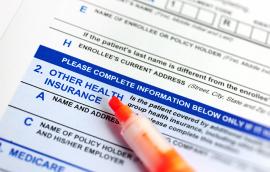HRMS Issue Brief #6: Affordability of Marketplace Plans for the Marketplace Target Population Half of Texans who are eligible for premium subsidies under the Affordable Care Act (ACA) and who looked for health plans in the ACA's Health Insurance Marketplace said cost was the main reason they didn’t enroll in a plan. That’s just one of the findings in a report released today by Rice University's Baker Institute for Public Policy and the Episcopal Health Foundation.
The report specifically looked at lower- to middle-income families in Texas who don’t have access to health insurance through an employer and who earn too much to qualify for public programs. That group includes approximately 2 million uninsured Texans and is a key target population of the ACA. The report found that virtually all of the target population knew about the ACA Marketplace and the available subsidies for health insurance premiums.
In addition, the report found that one-third of those aware of the marketplace looked for information on health insurance plans. Another one-third planned to look for that information in the future.
However, many Texans who looked for plans in the ACA Marketplace still didn’t enroll in a health insurance plan. The report found half of those who did not enroll said costs were the main reason – either costs were too high or they didn’t have enough money to enroll at that time.
The report is the sixth in a series on the implementation of the ACA in Texas. It was co-authored by Elena Marks, the president and CEO of the Episcopal Health Foundation and a health policy scholar at the Baker Institute, and Vivian Ho, the chair in health economics at the Baker Institute, a professor of economics at Rice and a professor of medicine at Baylor College of Medicine.
“The affordability of Health Insurance Marketplace plans, even with subsidies, has been an open question from the outset,” Marks said. “Perceptions about affordability may be preventing some Texans from enrolling in a plan. The intense, politically charged dialogue around the ACA in the state may have created misconceptions about the costs.”
Uninsured Texans may also think health coverage is too expensive because the cost is new to them, the report found. Even with subsidies, some families still would pay some amount for coverage – an added expense, regardless of the amount, not previously part of the family budget.
Also, the report found there’s evidence many uninsured don’t value health insurance or believe they can still use charity care programs that offer free or discounted medical care on a pay-as-you-go basis.
As the report showed, most of the uninsured knew about the ACA Marketplace and two-thirds looked, or planned to look, for information on health insurance plans. However, the report also discovered 29 percent not only hadn’t looked for marketplace information, they also didn’t plan to look for information in the future.
“Many of those who didn’t buy insurance will pay a penalty of $95 or 1 percent of income on their 2014 tax return,” Ho said. “That penalty rises to $695 or 2.5 percent of income in 2016, which will likely lead to more people enrolling in coming years.”
The Health Reform Monitoring Survey (HRMS)-Texas report is based on a national project that provides timely information on implementation issues under the Affordable Care Act and changes in health insurance coverage and related health outcomes. The Episcopal Health Foundation and Baker Institute are partnering to fund studies of and report on key factors about Texans obtained from an expanded representative sample of Texas residents. Today's report contains responses from 1,595 Texans in September 2013 and 1,538 in March 2014.
The survey was developed by the Urban Institute, conducted by the company GfK and jointly funded by the Robert Wood Johnson Foundation, the Ford Foundation and the Urban Institute.
The analyses and conclusions based on HRMS-Texas are those of the authors and do not represent the views of the Urban Institute, the Robert Wood Johnson Foundation or the Ford Foundation.
Elena M. Marks, Vivian Ho, Jennifer Mineo July 8, 2014





